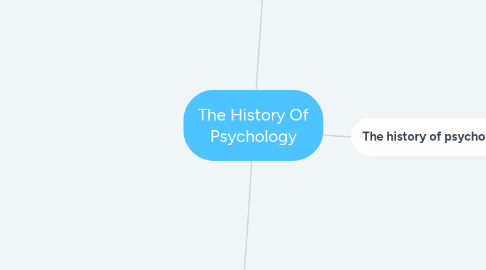
1. Physiology and psychologysics
1.1. Wilhelm Wundt (1832-1920)
1.1.1. Wilhelm help establish the field of experimental psychology by severing as a strong promoter of the idea that psychology could be an experimental field and by providing classes, textbooks, and a laboratory for training students. (David B. Baker &a Heather Sperry. NOBA 2016)
1.1.2. Introspection; the examination or observation of one's own mental and emotional processes.. (Dictionary.com)
1.2. Hermann mesasured the speed of NEURAL IMPULSE and the physiology of HEARING & VISION.
1.2.1. Within his research/work; our senses can deceive us and not mirror of the real world. The mind could be measured by methods of science. Suggest that a science of psy was feasible ( effected or accomplished )
1.2.2. Herman theory of 2 realities ; there's a psychological reality and a physical reality, both of them are not identical. John Locke had the same idea before H.H . Philosophical speculate the nature of mind, due to the subject of the rigors of science . ( Rigors; The quality of being exhaustion)
1.2.3. The question of the relationship between the mental (experience of the senses) and the material (external reality) was investigated by German researchers such as Gustavo Fechner & Ernst Weber . They called their work Psychophysic.
1.2.4. •PSYCHOPHYSICS; The methods conducted measurements of the relationship between physical stimuli and human perception that's is a basis for new science if psychology. (Fancher and Rutherford, 2011)
2. The pre history of psy
2.1. Philosophers and physiologist John Locke (1631-1704) Thomas Ried (1710-1796)
2.1.1. These 2 gentlemen promoted EMPIRICISM, the emphasize role of human observer and the primacy of the sense on how the mind acquires knowledge.
2.1.1.1. 1800s America Colleges were taught mental and moral philosophy. Mostly mind based on the faculties of intellect ,will, and senses.
2.1.1.1.1. Facility: an ability, natural or acquired. One of the Powers's of the mind, as memory, reason, or speech
2.1.1.1.2. Intellect; the power or faculty of the mind by which one knows or understands, as distinguished from that by which one feels and that by which one wills; the understanding; the faculty of thinking and acquiring knowledge. (Dictionary.com)
2.1.1.2. Moral philosophy; the branch of philosophy concerns with ethics
3. The history of psychology provides many prospectives
3.1. The history of psy guides us about the importance intersection of time and place that defines who we are
3.1.1. The important evidence of history in defining who we are cannot be understated

